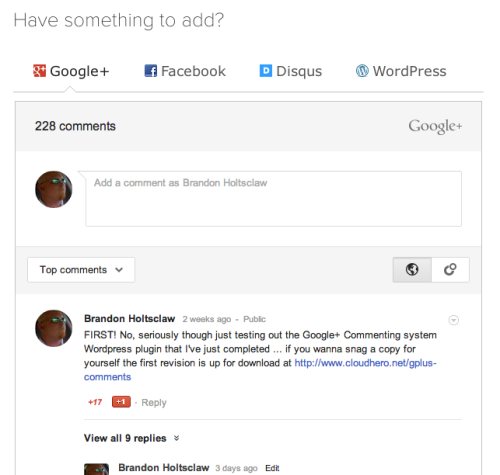Just when my Google+ authorship started to work, Jetpack plugin adds the same functionality with a two click setup. Oh, life.
Tag: Google Plus
WordPress plugin : Google+ Comments
WordPress plugin : Google+ Comments
This looks very interesting.
There is some overlapping functionality with Social plugin, which actually brings comments from social networks back into the WordPress installation. That’s a bit more useful in longer term, when social networks come and go. Social also brings in likes from Facebook, and retweets and favorites from Twitter. However for the discussion flow, this plugin might be a better fit. I’ll probably try it on for a few days just to see how it goes.
Why Google Reader Really Got the Axe
When Google announced its plans to shutter Google Reader in March, the Internet freaked out. Twitter users raised their virtual pitchforks in outrage. Bloggers wept, scrambling to find a suitable replacement by the service’s July 1 death date.
Wired runs a take on why Google Reader is almost no more. I do agree with most of the points on how the news consumption changed:
But there’s another reason Google decided to put its RSS reader to death. According to Mountain View, most of us simply consume news differently now than when Reader was launched.
“As a culture we have moved into a realm where the consumption of news is a near-constant process,” says Richard Gringras, Senior Director, News & Social Products at Google. “Users with smartphones and tablets are consuming news in bits and bites throughout the course of the day — replacing the old standard behaviors of news consumption over breakfast along with a leisurely read at the end of the day.”
Google Reader, and other RSS readers, subscribe to this “old” model. You sit, you pore through the day’s news link by link. Yes, some people are glued to their readers constantly. (Guilty!) And yes, you can use an app like Feedly to get your RSS fix on the go, but it’s a passive news-getting experience. With its updates to Now and Plus, Google wants its readers to take this more active approach to news consumption.
But I don’t like this narrow view of the Google Reader (or other RSS readers). RSS is not just for news. Sure, news are an important part of Really Simple Syndication, but it’s not the only one. There are many others – Wiki updates, mailing lists, commit messages, shopping updates for deals and stock clearances, etc. Even if Google considers supporting those with Google+, the support is not there yet. Heck, there isn’t even a publishing API for Google+. As a blogger, I have built up a small audience of subscribers, but there is currently no way for me to transfer them all to Google+. Unless I really push them, and then manually publish every post into Google+. It even sounds ridiculous.
We’ll see how it plays out …
Exclusive: Inside Hangouts, Google’s big fix for its messaging mess
Exclusive: Inside Hangouts, Google’s big fix for its messaging mess
How Google built its new messaging platform for Gmail, Android, iOS, and Chrome… and what took so long
Why you shouldn’t write off Google+ just yet
Why you shouldn’t write off Google+ just yet
I do agree with this bit:
Google+ is technically better than its rivals in a number of key ways. The user interface is comfortable and friendly. It’s easy to maintain circles of contacts, and to segregate what you share with each group. Discussions of small-to-medium sizes are manageable and readable — even in real time. Facebook wins when it comes to the open graph and app ecosystem, but a lot of people don’t care about that stuff.
And I’ve also seen the same as this:
For me, however, it’s all about engagement. When I share something on Google+, I get an interesting discussion — replies from friends long lost. The discussions are far more cohesive than Twitter’s 140-character, scatter-shot approach. And they are more far flung than what I get on Facebook
And something that I didn’t know is that Google employees’ bonuses are related to their projects’ success on Google+.
